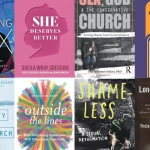The hidden battle in Christian higher education: A conversation with Scott Okamoto
This article originally appeared at Baptist News Global on May 12, 2023.
One of the most under-the-radar battles going on within American evangelicalism today is a civil war between Christian higher education and the local church.
If you’ve missed this new trend, there’s a good reason: The more overt stories of abuse within schools and churches catch our attention and cause us not to see the more subtle trends.
For example, Liberty University, the world’s largest Baptist school, entered the spotlight in recent years after Jerry Falwell Jr. stepped down due to a sex and financial scandal that included accusations of blackmail involving Michael Cohen, the former attorney to President Trump.

Rick Pidcock
The Master’s Seminary, led by John MacArthur, withdrew its membership from the Evangelical Council for Financial Accountability after their accrediting body put the school on probation due to their “climate of fear, intimidation and bullying,” while also mentioning “appearance of conflicts of interest with the president’s son-in-law supervising a contract from which he benefits.”
Bob Jones University saw the resignation of their widely beloved president, Steve Pettit, after the board of trustees became so upset about a male student looking “like a gay man” by wearing a wrap coat and about the length of female student’s shorts that they colluded behind Pettit’s back in a scheme involving alternative lawyers, secret meetings, unsecured computers, pictures of women’s bodies without their consent, and an overhaul of the board amidst a Title IX investigation.
Northern Seminary joined the fray when accusations of bullying were brought against President Bill Shiell, which led to a third of the students signing a letter to express no confidence in the board, the resignation of Shiell and the acting chair of the board, and one of the first whistleblowers being fired by the board.
Additional stories of power struggles in Christian higher education continue with Joe Rigney’s resignation at Bethlehem Seminary due to his embrace of Christian nationalism, Adam Greenway’s resignation at Southwestern Seminary due to financial liabilities and declining enrollment, the potential closing of The King’s College amidst financial chaos and a lack of transparency, and Karen Swallow Prior leaving Southeastern Seminary while citing that she does not share “the same vision for carrying out the Great Commission” and believes she is “not well-suited to the politics of institutional life in the SBC.”
While it is important for religion journalists to report on these stories, it can be tempting to get so caught up in the drama of the public explosions that we miss some of the underlying systemic conflicts plaguing Christian schools today.
An educational institution, a ministry or a business
In his newly released book, Asian American Apostate: Losing Religion and Finding Myself at an Evangelical University, R. Scott Okamoto writes: “It was often discussed among faculty, quietly, that EVU (the name Okamoto gives his former school in his book) was structured as a business instead of as a university. The product was a degree, and students were paying customers.”

Scott Okamoto
In an interview with Baptist News Global, Okamoto further explained: “I was part of a group of professors who noted the contradictions in how the school advertised itself as a ‘top-notch’ academic institution and a foundation for conservative, fundamentalist, evangelical faith. We knew the two were incompatible. And when it came to its predictable clashes, the fundamentalist side usually won out.”
Okamoto’s school was investigated by its accrediting board, leading to a two-year probation. Okamoto told BNG: “The probation report notes the meddling of the board with day-to-day operations, particularly the academic freedoms of the professors. The report also notes how the school claims to value academic freedom in contrast with professors and students who claim meddling from the board. I was visited by three board members in my classes after I was placed on a ‘bad’ list.”
Inextricably tied to capitalism and profit
Because evangelical schools are structured as businesses, their theology tends to bend the knee to capitalism.










Leave a Reply
Want to join the discussion?Feel free to contribute!